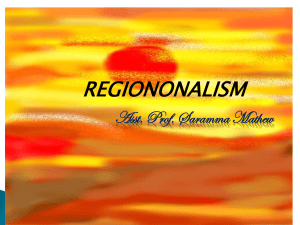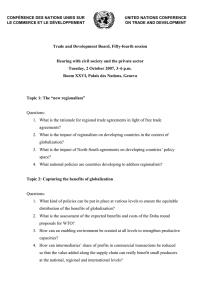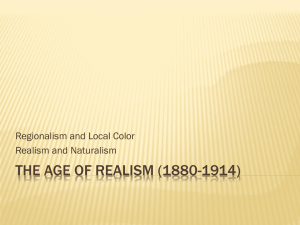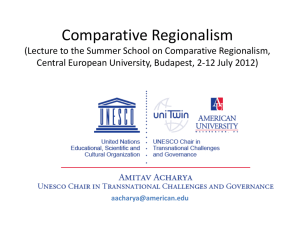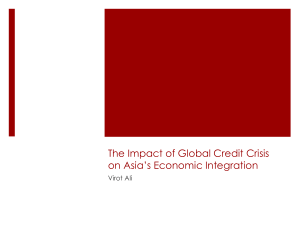Honors Program 2013-2014
advertisement
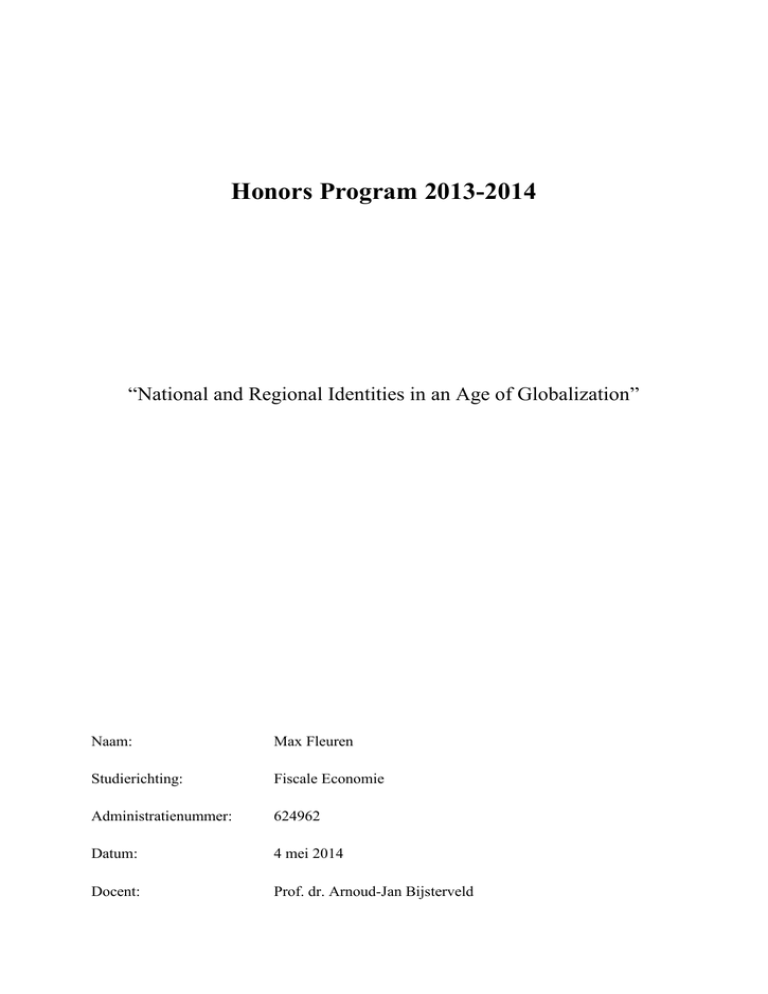
Honors Program 2013-2014 “National and Regional Identities in an Age of Globalization” Naam: Max Fleuren Studierichting: Fiscale Economie Administratienummer: 624962 Datum: 4 mei 2014 Docent: Prof. dr. Arnoud-Jan Bijsterveld ‘Europe of the Regions’ On the Increasing Importance of Regions in the European Union Abstract During the last few decades there has been a renewed interest in the position of regions in Europe. Organizations like the ‘European Committee of the Regions’ and the ‘Assembly of European Regions’ are promoting the political and economical role performed by regions in the European Union. Furthermore, due to the ever increasing integration of the European Union, the need for nation-states by regions has been reduced. As a consequence the prospect of disintegration of the nation-state is augmented by a strong European Union and therefore the existing nation-states in Europe are under threat. In the light of these developments the main question in this paper is: Are regions going to perform a more important role, while also considering that the European Union has taken over responsibilities historically performed by nation-states? Key Words: Regionalism, European Integration, Role of the State, Separatism, Supranationalism, Size of Nations Introduction to Regionalism in Europe The renewed interest in the region in Europe has led to more approval of regional differences and traditions, consequently the issue of regional identity is widely debated. The dominant modernization theory, that assumed that the separate regional economies, politics, and cultures would be swallowed up by the nation, has been proven wrong. The idea of having multiple identities has been recognized in recent debates. The local, regional, national and supranational identities do not have to be conflicting, on the contrary they can actually complement each other. Regional identities can actually give the national identity local roots. Also been shown has that such regional identities, just as nation identities, are mainly modern creations, or even entirely invented. However, regional identities are not equally strong and widely spread nor did regional movements have similar goals. Only some of them have begun to strive for cultural and political autonomy.1 Regional identity has been accepted as an important factor in the making of regions as social or political spaces. But it turned out to be difficult to explain what this identity consists of and how this regionalism affects the collective actions and politics of regions. The debate around regional identity has become visible in the discussion surrounding the concept of a ‘Europe of Regions’. Regions can mean many things, varying from mainly historical rhetoric to ethno-nationalism to the functioning of economic institutions and administration and the regionalization of certain units for the purpose of governance. The narratives of regional identity can lean on various determinants: from landscape, culture/ethnicity, dialects, economic prosperity, stereotypic images of people/communities or 1 E. Storm. 2003. “Regionalism in History, 1890-1945: The Cultural Approach.” European History Quarterly 2003 33; 251, p. 251-252 pag. 2 actual/invented histories. Regional identity has been noted for its role in regional planning and development.2 Due to the increase in attention for regional identity certain organizations have been called into existence in order to promote the ideals of having more autonomy and selfdetermination for these regions. The European Union itself has created the ‘European Committee of the Regions’ which promotes the role of regions in the Union. In its mission statement it states: “We claim autonomy for regional and local authorities and local authorities and their right to secure appropriate financial resources to enable them to carry out their duties. We therefore promote the principles and mechanisms of good governance and encourage the process of decentralization.” 3 Furthermore, there is an organization called the ‘Assembly of European Regions’. In their ‘Declaration of Regionalism in Europe’ it becomes apparent that they too busy themselves with creating more autonomy and recognition for regions. They strive to have regionalism recognized not only within the Union but also beyond: “At a time when, within Europe, the strengthening of the European Union is being reflected upon, the role of the regions in the unification process is gaining importance. Themes such as the distribution of responsibilities and the cooperation through partnerships between the various policy levels have consequently come to the fore, subsidiarity being the basic principle to define everyone's role.”4 After this short introduction to the concept of regionalism the rest of this paper will continue as follows: First a case will be made to show that the ever deepening of the European integration process and the role played by the European Union leads to less need for the nation state by regions. Thereafter a short summary will be given on actual cases of regionalism in Europe. It will become apparent that regions are already playing important roles and sometimes taking action to separate themselves from their nation-state. Lastly there will be given a conclusion and discussion. Theoretical Framework The decreasing importance of the nation state The idea of many of the founders at the beginning of the European unification project was that it would mean the end of national and ethnic divisions, with a possibility that it would lead to a universalistic European identity. European integration continues to deepen and extend multi-level governance in the European Union, at the same time the number of regionalist and separatist movements like the Scottish and the Basque national parties are on the rise. 5 The feasibility of regions with distinct identities that want to go ahead separate of their nation-state is improved due the supranational structure of the EU.6 A. Paasi. 2003. “Region and place: Regional identity in question.” Progress in Human Geography vol. 27, issue 4, pp. 475-485 Committee of the Regions. 2009. Mission Statement. Brussels. 4 Assembly of European Regions, AER. 1996. Declaration on Regionalism in Europe. Strasbourg: Assembly of European Regions. 5 S.K. Jolly. 2006. “A Europe of Regions? Regional Integration, Sub-National Mobilization and the Optimal Size of States.” Duke University, p. 1 6 S.K. Jolly. 2006. “A Europe of Regions? Regional Integration, Sub-National Mobilization and the Optimal Size of States.” Duke University, p. 2 2 3 pag. 3 Being part of a large nation-state has several advantages. Firstly, the per capita cost of public goods decreases with the number of people who finance them. Secondly, the size of the nation or region has a beneficial relation to the size of the domestic market. Thirdly, the risk of idiosyncratic, region-specific, negative shocks is mitigated by redistribution by the rest of the nation. Lastly, the military security concern is important for staying with a large nation as a region.7 However because of the increasing role of the EU, the need for the above standing considerations is decreasing. Concerning the public goods, many public goods (like stable monetary policy, foreign policy and trade authority) are increasingly being handled at the supranational level. Initiatives as the Emergency Response Coordination Centre8 and the Solidarity Fund for Disaster Relief 9 are providing some of the collective goods for smaller nations. The European Union also provides regulatory policy which lessens the burden placed on the administrative systems in place for governing regions. In the case of having access to economic markets, for any region or nation-state having access to a large market is essential for economic growth. When trade barriers exist it places a burden on the companies trying to do business. Since the European Union has done a lot of work in order to create a single market with as few barriers as possible (both tariff and nontariff), the size of the domestic market is less important than before. Also, the European Union now serves as a stand-in for individual states in many international trade forums. Smaller nations (and regions) now have the backing of the second largest market in the world, which certainly helps to gain access to international markets. The trade-off between local autonomy and access to global or even regional markets has therefore become less existent. The European Union also helps to lessen the need for state intervention in case of region-specific negative shocks. Normally the nation-state to which the region belongs offers protection from these shocks. The potential loss of these sort of subsidies actually served as a way to weaken the enthusiasm for independence among the Scottish population. The Scottish National Party were in the past not able to convince factory workers that leaving the United Kingdom would not result in more unemployment due to the stop of these subsidies. The European Union is more and more capable of serving this need, at least to a certain degree. Structural funds from the European Union have a couple of distinct goals, like assistance to areas affected by low GDP, high unemployment, sparse population, and industrial decline. Even though these funds remain relatively small in comparison to that provided at the level of the nation-state, they do ease some of the disadvantages of small nation-states or regions. Lastly, the size of nations has historically always affected the security of the nationstate, because there is strength to be found in numbers. Due to the interdependent international system this key advantage of larger nation-states has been removed in Europe. If, for example, the Scottish population would leave the United Kingdom they would still be protected by NATO. If the European Union continues its integration to the point of having a multinational European army the advantage of having a large state would decrease even more in the light of security concerns.10 7 Alesina, Alberto, and Enrico Spolaore. 1997. "On the Number and Size of Nations." Quarterly Journal of Economics: 1027-1056. Retrieved from: http://ec.europa.eu/echo/about/ERC_en.htm 9 Retrieved from: http://ec.europa.eu/regional_policy/thefunds/solidarity/index_en.cfm 10 S.K. Jolly. 2006. “A Europe of Regions? Regional Integration, Sub-National Mobilization and the Optimal Size of States.” Duke University, p. 21-23 8 pag. 4 Practical Analysis Regionalism across Europe The European Union appears to be increasingly disliked by the constituents. While the rise of the EU was always likely to create Eurosceptic, nationalist backlash, it has also led to a more unexpected and little talked about consequence. During the last two decades the EU has diminished the sovereignty of the existing nation-states and promoted a supranational sense of belonging. This process has helped to revive historic ethno-regionalist causes.11 In order to show cases of regionalism in Europe some of these examples will be given in this segment. Flanders - In June 2010 the elections in Belgium produced a victory for the New Flemish Alliance, which favors the gradual break-up of the nation-state. At the same time this political party is notable for its commitment to European integration. The party is very proEU, and their tagline is ‘Necessary in Flanders, useful in Europe’. The party envisions a ‘democratic European confederation’ with Flanders as part of it.12 13 Scotland - The argument for Scottish independence is by no means a new one. But nationalism today influences Scottish politics much more than it did some time ago. In 1997 the Scottish voted overwhelmingly in favor of the devolution of many powers to Scotland. After the 2007 elections, the Scottish National Party managed to form a government. The SNP stands for an independent Scotland which further integrates itself within the European Union. Earlier, in the last century, Scotland would have found splitting from England a intimidating task. But the European Union didn't have the presence then that it does have now. Today, belonging to an international union of half a billion people, especially one whose structure is designed to give small countries a say, allows these groups to be able to go ahead separately.14 15 In a speech made by the first minister of Scotland the following has been said: “Now, there is a new world developing in Europe. It is a world where people want to be independent and interdependent.”16 It summarizes neatly the consensus felt among some regions, they want to be able to have self-determination, while at the same time cooperating heavily with other regions and nationstates. Catalonia - Spanish Catalonia tends to think of itself as a nation instead of a region. It’s hard to disagree with their statement, even though Catalonia has not know political independence for hundreds of years. Among the early European nations they were a medieval imperium whose maritime power extended to large parts of the Mediterranean Sea. They do not only consider Barcelona as the most important city of the Mediterranean, but also consider themselves as being the north of the south and more important the south of the north. They feel connected to the community of Northern European nations and the single market of E.B. Martin. 17 September 2010. “The E.U. and Regionalism. E.U. integration is encouraging regional nationalism” The Hardvard Crimson. Retreived from: http://www.thecrimson.com/article/2010/9/17/eu-flemish-scotland-new/ 12 C. Terry. February 6 2014. “New Flemish Alliance.” The Democratic Society. Retrieved from:http://europe.demsoc.org/2014/02/06/newflemish-alliance/ 13 E.B. Martin. September 17 2010. “The E.U. and Regionalism. E.U. integration is encouraging regional nationalism” The Hardvard Crimson. Retreived from: http://www.thecrimson.com/article/2010/9/17/eu-flemish-scotland-new/ 14 E.B. Martin. September 17 2010. “The E.U. and Regionalism. E.U. integration is encouraging regional nationalism” The Hardvard Crimson. Retreived from: http://www.thecrimson.com/article/2010/9/17/eu-flemish-scotland-new/ 15 S.K. Jolly. 2006. “A Europe of Regions? Regional Integration, Sub-National Mobilization and the Optimal Size of States.” Duke University, p. 171-172 16 A. Salmond. April 28 2014. “Scotland’s Place In Europe” The Scottish Government. Retrieved from http://news.scotland.gov.uk/Speeches-Briefings/Scotland-s-Place-in-Europe-bdf.aspx 11 pag. 5 hundreds of millions consumers. However their separatism has its limits. Spain isn’t likely to give away control over the richest part of Spain which provides them with large revenues. Pasquall Maragall, a former mayor of Barcelona, is said to have envisioned a resurrection of city-states, some of which would form a metropolitan system stretching across the Mediterranean. In his opinion such a system can function better and more productive than one of nation-states.17 Germany – The regionalism in Germany has strong roots. Its short but turbulent history as a nation-state has strengthened the regional instincts of its people. At the present the Germans exist comfortably within their federal structure. Most of them feel as if they are living again as Thuringians or Bavarians first and German second. Perhaps due to their experiences in the Second World War it’s easier to say “I am a Saxon” than to say “I am a German”. Some of them even add “I am also a European”. The model of German federalism seems to be a viable way for accommodating regionalism across Europe. However, this system requires a large administrative capacity at the regional level, most regions in Europe will not be able to live up to this task.18 France - In France there are concerns that a piece of the southwest will fall (again) in the Catalan sphere of influence. French cities in this region that were once cultural center of Catalonia are watching a lot of Catalan television and the area around Toulouse is doing a lot of business with Catalonia. The Rhone-Alpes is the strongest region of France and Lyon, its capital, is the second largest city of France and a major international center. The commercial policies in Lyon are increasingly gaining independence and Lyon is extending its European and global reach. However, the people in Lyon still consider themselves to be decidedly French and do not have the ambition of the Catalan nationalists to go ahead separately. But they do have a desire to “run their own show” and to create external commercial links in order to be able to compete more effectively in the European and global markets.19 Conclusion and discussion On the one hand the nation-state has turned out to be too big to run everyday life and on the other hand it’s too small to manage international affairs. At least that is what many of the regional and big-city leaders in Europe are saying, who themselves are gaining more influence and authority. These cities and regions are receiving bigger budgets and are creating more professional administrations in order to run more of the everyday life of its citizens.20 Consequently people are wondering whether regions are gradually taking over the role of nation-states regarding political authority and in upholding public policies. For a couple of reasons the European government do not longer seem capable of fulfilling the obligations of the social contract. Ensuring jobs and prosperity for its citizens is getting harder to realize. The national cultures are under attack because of a broader worldwide popular culture and a J. Newhouse. 1997. “Europe’s Rising Regionalism” Foreign Affairs. Retrieved from http://www.foreignaffairs.com/articles/52645/johnnewhouse/europes-rising-regionalism 17 18 J. Newhouse. 1997. “Europe’s Rising Regionalism” Foreign Affairs. Retrieved from http://www.foreignaffairs.com/articles/52645/johnnewhouse/europes-rising-regionalism 19 J. Newhouse. 1997. “Europe’s Rising Regionalism” Foreign Affairs. Retrieved from http://www.foreignaffairs.com/articles/52645/johnnewhouse/europes-rising-regionalism 20 J. Newhouse. 1997. “Europe’s Rising Regionalism” Foreign Affairs. Retrieved from http://www.foreignaffairs.com/articles/52645/johnnewhouse/europes-rising-regionalism pag. 6 reviving of regional cultures. Regionalism seems to be a current and future trend within Europe.21 Though its sources vary, it seems that this regionalism is partly a protest against the authority of national capitals by people who see themselves belonging more to ‘Europe’ than to a nation-state with its misty origins and arbitrary borders. Regionalism has, besides this return to local cultural roots and distancing from national governments, much to do with economic prosperity. Many (or even most) of the wealthiest regions in Europe are interacting with one another and are creating super-regions (large economic zones that exceed national borders).22 An example of this is the Four Motors for Europe-project, in which four highly industrialized regions in Europe are working together in order to promote economic growth in their regions as well as promoting the role of Europe’s regions within the European Union.23 The hostility of regions to distant administrations may seem to target the institutions of the European Union as much as the national institutions. However, to take full advantage of economies of scale and in order to be a global competitor, regions across Europe need a single market.24 The decreasing need for the nation-state by regions has already been examined. The outcome of this research was that European integration has a clear and significant effect on the electoral success of regional political parties. Since integration strengthens regional political parties it can be stated that it therefore increases the sub-national movements within nation-states.25 In regard to the likeliness of the creation of a “Europe of Regions”, the prospect of the vanishing of nation-states isn’t very likely. The significance of regions seems to be more economical than political. The impact of regionalism is mostly felt in regions that are very populous and are performing well. The nation-state still has tasks that are better suited to be performed by them, like defense and taxation. Furthermore, the nation-state has a firm grip on the institutions of the European Union. However, it becomes clear that the nation-state isn’t just under attack from the European Union but also parts of their own nation-state are vocalizing a call for more independence.26 E.B. Martin. September 17 2010. “The E.U. and Regionalism. E.U. integration is encouraging regional nationalism” The Hardvard Crimson. Retreived from: http://www.thecrimson.com/article/2010/9/17/eu-flemish-scotland-new/ 22 J. Newhouse. 1997. “Europe’s Rising Regionalism” Foreign Affairs. Retrieved from http://www.foreignaffairs.com/articles/52645/johnnewhouse/europes-rising-regionalism 23 Retrieved from: http://www.4motors.eu/-Organization-.html 24 J. Newhouse. 1997. “Europe’s Rising Regionalism” Foreign Affairs. Retrieved from http://www.foreignaffairs.com/articles/52645/johnnewhouse/europes-rising-regionalism 25 S.K. Jolly. 2006. “A Europe of Regions? Regional Integration, Sub-National Mobilization and the Optimal Size of States.” Duke University, p. 170 26 J. Newhouse. 1997. “Europe’s Rising Regionalism” Foreign Affairs. Retrieved from http://www.foreignaffairs.com/articles/52645/johnnewhouse/europes-rising-regionalism 21 pag. 7 List of Used Literature E. Storm. 2003. “Regionalism in History, 1890-1945: The Cultural Approach.” European History Quarterly 2003 33; 251 Paasi. 2003. “Region and place: Regional identity in question.” Progress in Human Geography vol. 27, issue 4, pp. 475-485 Committee of the Regions. 2009. Mission Statement. Brussels. Assembly of European Regions, AER. 1996. Declaration on Regionalism in Europe. Strasbourg: Assembly of European Regions. S.K. Jolly. 2006. “A Europe of Regions? Regional Integration, Sub-National Mobilization and the Optimal Size of States.” Duke University Alesina, Alberto, and Enrico Spolaore. 1997. "On the Number and Size of Nations." Quarterly Journal of Economics: 1027-1056. E.B. Martin. 17 September 2010. “The E.U. and Regionalism. E.U. integration is encouraging regional nationalism” The Hardvard Crimson. Retreived from: http://www.thecrimson.com/article/2010/9/17/eu-flemish-scotland-new/ C. Terry. February 6 2014. “New Flemish Alliance.” The Democratic Society. Retrieved from: http://europe.demsoc.org/2014/02/06/new-flemish-alliance/ A. Salmond. April 28 2014. “Scotland’s Place In Europe” The Scottish Government. Retrieved from http://news.scotland.gov.uk/Speeches-Briefings/Scotland-s-Place-in-Europe-bdf.aspx J. Newhouse. 1997. “Europe’s Rising Regionalism” Foreign Affairs. Retrieved from http://www.foreignaffairs.com/articles/52645/john-newhouse/europes-rising-regionalism http://www.4motors.eu/-Organization-.html http://ec.europa.eu/echo/about/ERC_en.html http://ec.europa.eu/regional_policy/thefunds/solidarity/index_en.cfm pag. 8
